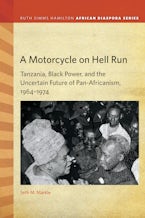Between 1964 and 1974 Tanzania came to be regarded as a model nation and a leading frontline state in the struggle for African liberation on the continent and beyond. During this time, a number of African American and Caribbean nationalists, leftists, and pan-Africanists traveled to and settled in Tanzania to join the country that many believed to be leading Africa’s liberation struggle. This historical study examines the political landscape of that crucial moment when African American, Caribbean, and Tanzanian histories overlapped, shedding light on the challenges of creating a new nation and the nature of African American and Caribbean participation in Tanzania’s nationalist project. In examining the pragmatic partnerships and exchanges between socialist Tanzania and activists and organizations associated with the Black Power movements in the United States and the Caribbean, this study argues that the Tanzanian one-party government actively engaged with the diaspora and sought to utilize its political, cultural, labor, and intellectual capital to further its national building agenda, but on its own terms, creating tension within the pan-Africanism movement. An excellent resource for academics and nonacademics alike, this work is the first of its kind, revealing the significance of the radical political and social movements of Tanzania and what it means for us today.

